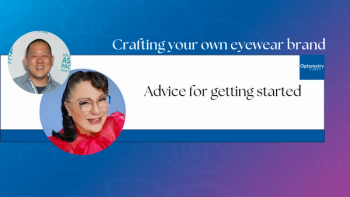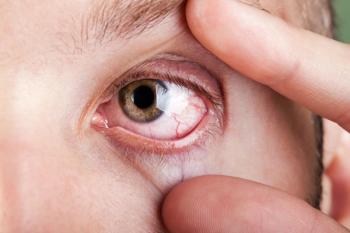
Why you need to be a good salesperson
my fellow shared with me that after I left the room, the patient complained about me being a “salesman.” Awestruck, I came away realizing that my best intents and clinical knowledge had been taken the wrong way and that the cost of the best treatment for this patient were overshadowed by the fact that she was going to have an out-of-pocket cost.
Last week, I had a patient who came in with severe dry eye. She had tried several different eye drops and was not finding relief. She had gone through a course of steroids and was noting that they brought short-term relief, but her doctor told her to stop using the steroid treatments after three weeks because of the risks.
Upon evaluation of the patient’s dry eye, we noted that she had pretty bad atrophy of her meibomian glands when imaged with our meibographer (75 percent of glands were gone). Her lipid layer thickness was about half as thick as it should be, and her glands were plugged upon evaluation with our meibomian gland expresser. The patient shared with us that her biggest fear is that her dry eye will continue to get worse as time goes on. She has noted a remarkable increase in her symptoms over the last three years and fears what she will do if it gets any worse.
Developing a game plan
Seeing the significance of her dry eye and the signs and symptoms that she was experiencing, we quickly came up with a plan. She needed to be on Restasis (cyclosporine, Allergan) long term. This will help her create more and better tears but also keep her inflammatory dry eye at bay as best as we know how. She also needed an adjustment in her artificial tear-one that is specific to her condition and that will best support the lipid deficient type of dry eye that she has. Lastly, and most importantly, she needs LipiFlow (TearScience) to help get her glands to flow more freely in the future.
We shared with her how the treatment strategy will not help her so much in the short term, but as time goes on she should see some relief and that the treatment with LipiFlow and Restasis is intended to preserve her eyes in the long term, and hopefully, slow down the progression of her chronic and progressive disease.
At the end of the visit, the patient shared that the cost was just too much for her and that she would need to do something else. We shared the benefits again and asked her to come back for follow up on the other treatments and to see how she was doing at that time.
Later, my fellow shared with me that after I left the room, the patient complained about me being a “salesman.” Awestruck, I came away realizing that my best intents and clinical knowledge had been taken the wrong way and that the cost of the best treatment for this patient were overshadowed by the fact that she was going to have an out-of-pocket cost. She explained that if the treatment was covered, then she would proceed. She stated that it would obviously be covered if it worked.
Do what is best for the patient
If you know me, you know me to be a pretty genuine person. Mile Brujic, OD, FAAO, and I have lived by a statement that we coined together: “Do what is best for the patient, in the end it will benefit your practice and the industry.”
Fact of the mater is that some patients believe that their healthcare costs should be 100 percent paid for. As a large specialty practice, we see patients who need vision therapy, custom contact lenses, and advanced dry eye treatments. Our doctors are amazed at how many patients tell us that the recommendations we are prescribing must not be all the way vetted yet because if they had been, their insurance company would pay for the diagnostics and/or treatments.
Does that mean that we should prescribe only treatments that are 100 percent paid for by insurance companies? This would preclude things like corneal cross-linking, BlephEx (Rysurg), nutraceuticals, LipiFow, some genetic testing. Some may be surprised that this would also preclude glasses, contact lenses, LASIK, and custom intraocular lenses. True, some of these treatments have a portion covered by insurance, which perhaps, means that insurance companies think that these procedures kinda work but not all the way?
You’re already selling
If you are a practitioner who doesn’t bring in diagnostics or treatments that are not covered by insurance because you think that you will end up sounding like a salesperson and that is not why you became an optometrist, I have some suggestions. We are selling our patients on glaucoma when we tell them they need treatment. We are selling them that their eyeglass prescription has changed. We sell them that they need regular eye exams regardless of if they think that their vision is blurry. We sell the benefits of what we do.
I have never met a good optometrist who was not good at “selling” his patients on the importance of his treatments-covered by insurance or not. I am again for the millionth time going back and reviewing my presentation skills to my patients. I’m looking for improved ways to present my treatments so that patients never feel like I am a salesperson. The best sign of a “great salesperson,” as my fellow just pointed out, is that he builds such a strong level of trust that the patient never knows that she was just sold.
Newsletter
Want more insights like this? Subscribe to Optometry Times and get clinical pearls and practice tips delivered straight to your inbox.













































